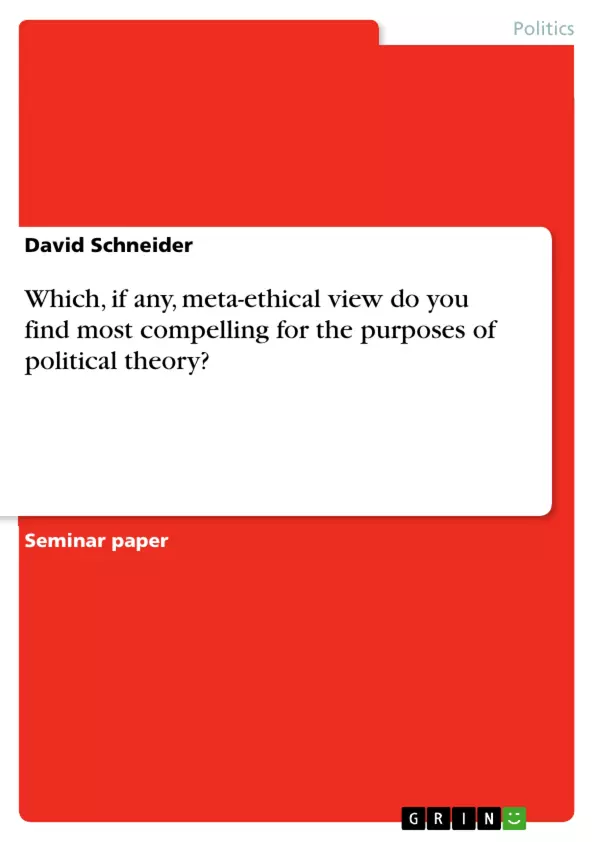Meta-ethics, the study of the ontological foundations of ethics, is one of the big topics for moral and political philosophy. In this essay I argue that conventional constructivism (conventionalism) is the most compelling meta-ethical view for the purposes of political theory. First, (i) I determine what the purposes of political theory are. Then, (ii) I define logical validity and the ability to accommodate pluralism as requirements that a meta-ethical view must fulfil to be compelling for the purposes of political theory. Since conventional constructivism is a cognitivist, minimal realist and non-objectivist view, I show that a) cognitivism is logically valid, b) minimal realism is reasonably preferable to error theory and c) full-blown realism, opposed to non-objectivism, doesn’t fulfil the requirement of validity. I provide examples which illustrate that this applies also to virtual reality (“VR”). Based on a)–c), I argue that d) non-objectivist conventional constructivism fulfils both the validity and the pluralism requirement for a meta-ethical view to be compelling for the purposes of political theory. I support this with what I call the wake-up argument.
Inhaltsverzeichnis (Table of Contents)
- Which, if any, meta-ethical view do you find most compelling for the purposes of political theory?
- The purposes of political theory
- Requirements for a compelling meta-ethical view for the purposes of political theory
- Cognitivism is logically valid
- Minimal realism is reasonably preferable to error theory
- Full-blown realism, opposed to non-objectivism, doesn't fulfil the requirement of validity
- Non-objectivist conventional constructivism fulfils the validity and the pluralism requirement
Zielsetzung und Themenschwerpunkte (Objectives and Key Themes)
The essay aims to determine the most compelling meta-ethical view for the purposes of political theory, focusing specifically on analytic political theory. It argues that conventional constructivism, a form of non-objectivism, best meets the criteria of logical validity and the ability to accommodate pluralism.
- The purpose of political theory and its focus on conceptual, normative, and evaluative questions
- The requirements of logical validity and pluralism for a compelling meta-ethical view
- The defense of cognitivism as logically valid
- The superiority of minimal realism over error theory
- The inadequacy of full-blown realism and the strengths of non-objectivist conventional constructivism
Zusammenfassung der Kapitel (Chapter Summaries)
- The essay begins by outlining the purpose of political theory, emphasizing its focus on analytical approaches and the importance of logical validity. It then establishes the requirement for a meta-ethical view to accommodate pluralism.
- The author defends cognitivism, arguing that moral claims can be treated as truth-apt propositions and are subject to the same reasoning patterns as empirical claims. This argument relies on the Frege-Geach Problem and addresses Michael Smith's moral problem.
- The essay then contrasts minimal realism with error theory, arguing that the principle of charity in interpreting human actions makes minimal realism a more plausible view. It then rejects full-blown realism, both naturalistic and non-naturalistic, for its logical inconsistencies and inability to account for the causal closure of the natural world.
- Finally, the essay proposes conventional constructivism as the most compelling meta-ethical view. It highlights the non-mysterious and logically valid nature of this approach, emphasizing its ability to accommodate pluralism through its emphasis on social conventions and the construction of moral facts within specific groups or practices.
Schlüsselwörter (Keywords)
This essay explores key concepts in meta-ethics, particularly focusing on conventional constructivism as a compelling framework for political theory. Central themes include logical validity, pluralism, cognitivism, minimal realism, error theory, full-blown realism, non-objectivism, and the construction of moral facts within specific communities or practices. The essay also addresses the implications of virtual reality and the potential for moral discourse in a simulated environment.
Frequently Asked Questions
What is conventional constructivism in meta-ethics?
It is a non-objectivist view suggesting that moral facts are constructed based on social conventions and shared practices within a community.
Why is cognitivism considered logically valid?
Cognitivism argues that moral claims are truth-apt propositions, allowing them to follow standard logical reasoning patterns like empirical claims.
What is the main requirement for meta-ethics in political theory?
A compelling view must fulfill the requirements of logical validity and the ability to accommodate pluralism.
How does minimal realism differ from error theory?
Minimal realism is preferred because it uses the principle of charity in interpreting human actions, unlike error theory which views all moral claims as false.
Can moral discourse exist in virtual reality (VR)?
Yes, the author uses VR examples to illustrate how moral facts can be constructed and remain valid within simulated environments.
- Quote paper
- David Schneider (Author), 2018, Which, if any, meta-ethical view do you find most compelling for the purposes of political theory?, Munich, GRIN Verlag, https://www.grin.com/document/417210



